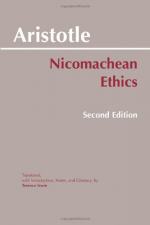
|
| Name: _________________________ | Period: ___________________ |
This test consists of 15 multiple choice questions and 5 short answer questions.
Multiple Choice Questions
1. Which of the following is NOT characteristic of Aristotle's magnanimous man?
(a) Slowness of movement.
(b) Lack of wonderment.
(c) Anxiety.
(d) A deep voice.
2. How many types of virtue does Aristotle claim exist at the beginning of Book II?
(a) Two.
(b) Seven.
(c) One.
(d) Three.
3. With what is V.10 concerned?
(a) The equitable.
(b) The aristocracy.
(c) The distributable.
(d) The oligarchy.
4. The attainment of serious moral stature is described by Aristotle in II.9 as being what?
(a) Natural.
(b) Hard work.
(c) Impractical.
(d) Almost impossible.
5. In how many ways are things called courage according to Aristotle in Book Three?
(a) Five.
(b) Ten.
(c) Six.
(d) One.
6. The equitable distribution of justice is a certain kind of what, according to Aristotle?
(a) Excess.
(b) Exactness of arithmetic.
(c) Deficiency.
(d) Proportion.
7. What is a suitable category, in Aristotle's view, in which to place the feeling of shame?
(a) Virtues.
(b) Vices.
(c) Feelings.
(d) Conditional values.
8. In addition to the life of pleasure and the life of politics, what is the third sort of life that Aristotle mentions?
(a) The contemplative life.
(b) The life of servitude.
(c) The hermetical life.
(d) The life of rebellion.
9. A buffoon is described by Aristotle in IV.8 as someone who goes to extremes in order to make someone else do what?
(a) Steal.
(b) Laugh.
(c) Abjure the gods.
(d) Cry.
10. Which of the following does Aristotle not list as a theory of that by which happiness comes about?
(a) Divine providence.
(b) Biological nature.
(c) Learning.
(d) Training.
11. Aristotle states in I.6 that it is nobler to give the higher honor to which of the following?
(a) The state.
(b) The truth.
(c) One's self.
(d) One's friends.
12. From what does being in bad shape come to be evident, according to Aristotle?
(a) What ends it produces.
(b) How the person acts.
(c) What symptoms it displays.
(d) What constitutes being in good shape.
13. What is the virtuous disposition most directly concerned, for Aristotle, with playfulness and humor?
(a) Wisdom.
(b) Charm.
(c) Wit.
(d) Pleasantness.
14. Deliberation is, for Aristotle, principally about the things to be done by whom?
(a) Oneself.
(b) Others.
(c) The community.
(d) The state.
15. Where is the source of a willing act located, according to Aristotle?
(a) In oneself.
(b) External to oneself.
(c) In one's nature.
(d) In one's disposition.
Short Answer Questions
1. About what does man deliberate, according to Aristotle in III.3?
2. What determines, according to Aristotle's arguments in V.8, the justice or injustice of one's actions?
3. At what does every action seem to aim, according to Aristotle?
4. What extreme is most comparable to the virtue of courage in the opinion of Aristotle?
5. Who is the source of action, according to Aristotle, of one who acts from spiritedness?
|
This section contains 477 words (approx. 2 pages at 300 words per page) |

|




